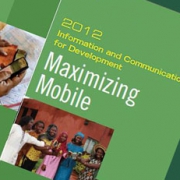Should the $35 Aakash Tablet be Dubbed “Educational”?
From Mr Tuli’s presentation yesterday at the World Bank on India’s new low-cost tablet Aakash, and the discussions that followed, I differ to agree that the device is Educational as being dubbed.
Launched in October this year by the country’s Minister for Human Resource Development, Aakash has been described by some as potentially heralding a new “Internet revolution” within India education, doing for educational computing what the mobile phone has done for personal communications over the past decade.
Through a live Webcast and twitter, the CEO of Datawind, Suneet Singh Tuli presented his case to the World Bank and his global audience on why the Aakash tablet computer will revolutionize education in India and possibly in other parts of the developing world. Mr. Tuli focused his talk on the device, affordability, connectivity or access to the Internet, content, and sustainable business models to drive broad adoption of the device in the developing world through an ecosystems approach in an event organized by the Open Data Innovations Network (ODIN) of the Bank with the key concern of what is different this time around (Listen to the recorded webcast).
In response to his talk, several questions, concerns, and comments both from the face-to-face audience and through social media were centered on content. This is because of the christening of the device as “educational”. I tend to agree with most of the comments that the device could have an educational component but education should not be the heart of the tablet. Aakash is a technological innovation and should be presented as such and left for users to decide how to use it. Using it for education in India because of the available educational content or training materials at the time does not make it an educational device.
I believe Aakash could be revolutionary in nature due to its current low cost – the actual cost of $60 or the subsidized rate of $35. The focus should be on exploring its potential within all sectors of development to facilitate communication of information. Access to information and knowledge is the driving force for development in the current information age and the knowledge society. Mobile technologies are having great impact on the developing world as a result of their unique capability to connect rural people to informational resource – health, agriculture, education, market, democracy and governance, among others. For Aakash to have any impact on any or all of these development sectors will require some kind of collaboration with Value Added Service (VAS) providers – content developers.
The CEO of Datawind also sought the support of the World Bank through its networks with national governments in the developing world to help in the adoption and use of the device to help meet the educational goal by incorporating it into their educational curriculum. But I wonder if this is the right time for such a policy action by an international development agency at this early stage of the innovation.
An interesting review of Aakash can be found here.







































